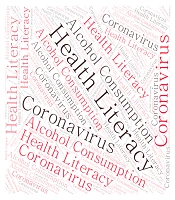Dear Editor,
The World Health Organization has defined health literacy as " cognitive and social skills that form the motivation and ability to access, understand, and use of knowledge in ways that promote and sustain good health"(1). People are always engaged with challenges regarding making decisions to bring about change in their lives and their health. Low or limited health literacy affects the ability of individuals to search for and use of knowledge, adopting healthier habits, and being prepared for public health emergencies. Limited health literacy is associated with poorer health outcomes and higher health expenditures (2). As the widespread of false information has blurred the lines between what is true or false, seeking valid and reliable information is of crucial importance, which indicates the importance of evaluating information (3). The internet is an open door to both valid and misleading information. Several studies have reported low levels of health literacy among Iranians (4-6). The first case of Covid-19 infection was officially announced at the beginning of 2020. Internet, also named cyberspace, is a common source of information, mainly through social media. Covid-19 has infected tens of thousands of Iranians and claimed many lives (7).
Unfortunately, conflicting information has resulted in misunderstandings about the Covid-19 in Iran. As a result, lack of access to valid information has caused several difficulties, similar to what happened regarding drinking alcohol (8). More than 100 cases are died due to alcohol poisoning (9, 10). The media provides information on the prevention of Covid-19 that may also contain invalid information. Therefore, a number of people in the community are not able to distinguish valid information from false (11). Often, invalid information related to cyberspase. Therefore, not evaluating information can be attributed to low health literacy (12, 13).
In conclusion, sufficient health literacy is a real need. Thus, more so cyberspace is vital. In most of the developed countries, all citizens have a family physician (11), who provides them with valid information. In our country, Iran, health care providers can take on this role. Dissemination of accurate information is a crucial step for promoting the health literacy of societies, particularly through cyberspace. Thus, take-home messages can clarify accurate information that increase the tendency to healthy behaviors.
Although health literacy is a major contributor to improved health, according to the best knowledge of the authors, no study has investigated the association between health literacy and alcohol consumption. Hence, further studies are required.
